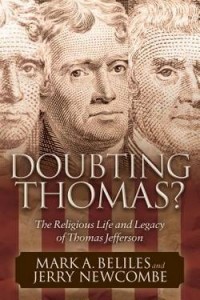Religion
Related: About this forumThe father of freedom
Jefferson and religious liberty

Jan 2nd 2015, 10:41 by B.C.
IF THERE is one individual who first gave expression to the American ideal of freedom, and religious freedom in particular, it was Thomas Jefferson. Indeed, the third president himself had very clear ideas on his role in history. He laid down that his tombstone should record three achievements: his authorship of the Declaration of Independence; the statute of religious freedom in his home state of Virginia; and the establishment of the University of Virginia.
Nobody questions Jefferson’s decisive part in establishing liberty of belief. But almost everything else about the statesman’s complex attitude to metaphysical matters has been argued over furiously, and the arguers have plenty of raw material. In the course of American history, “freedom of religion” has itself become a kind of religion, and Jefferson’s words, including the 18,000 letters he wrote during his 83 years of life, serve as a kind of holy writ. To this day, many of the bitterest ideological battles raging across America (over prayer in schools, creationism, religious entitlements at work, and so on) are conducted in the name of different visions of religious liberty. So different factions naturally turn to the creator of that ideal, pore over his writings, and ask the unanswerable question: what would Jefferson do?
On one hand, secularists and religious sceptics point with relish to Jefferson’s utter contempt for “priestcraft” and religious power structures of all kinds. Religious believers can retort by stressing his reverence for Jesus as a moral teacher and reformer, and his clear belief in a supreme or providential power. A controversial Texan evangelical, David Barton, has sought to invoke Jefferson in support of his view that America was explicitly founded as a Christian country; but in 2012 a Christian publishing house withdrew at the last moment from circulating a book by Mr Barton on that theme, on grounds that the accuracy of his arguments was open to question. Mr Barton and his supporters objected strongly.
A new book on Jefferson’s religion, “Doubting Thomas”, steers a middle course. On one hand, it squarely accepts that especially after 1800 (in other words, during his presidency and above all, in retirement) Jefferson explicitly renounced many tenets of traditional Christianity. His enquiring and “enlightened” mind had no time for unfathomable mystery. If the idea of one God in three persons was beyond human understanding, it must be wrong. He was exasperated by elaborate theological systems and their authors, from the early church father Athanasius to the Protestant thinker John Calvin. Jefferson disliked the Calvinist notion of “salvation by faith alone” and was inclined to the opposite view; people should be rewarded for what they do, not what they believe. His classically trained intellect led him to the view that diversity of belief should be welcomed, not condemned or punished.
http://www.economist.com/blogs/erasmus/2015/01/jefferson-and-religious-liberty
LiberalEsto
(22,845 posts)"Like many others of his time (he died just one year after the founding of institutional Unitarianism in America), Jefferson was a Unitarian in theology, though not in church membership. He never joined a Unitarian congregation: there were none near his home in Virginia during his lifetime. He regularly attended Joseph Priestley's Pennsylvania church when he was nearby, and said that Priestley's theology was his own, and there is no doubt Priestley should be identified as Unitarian. Jefferson remained a member of the Episcopal congregation near his home, but removed himself from those available to become godparents, because he was not sufficiently in agreement with the trinitarian theology. His work, The Jefferson Bible, was Unitarian in theology. For a slightly different analysis (one that slights the fact that the Unitarians were not formally organized into a sect until 1825), see the relevant "Matters of Fact" factsheet at the Monticello website."
http://www.famousuus.com/bios/thomas_jefferson.htm
http://www.2think.org/tj.shtml